Cremation, Caste, and Cosmogony in Karmic Traditions.
Cremation, Caste, and Cosmogony in Karmic Traditions.
Cremation, Caste, and Cosmogony in Karmic Traditions.
You also want an ePaper? Increase the reach of your titles
YUMPU automatically turns print PDFs into web optimized ePapers that Google loves.
Death <strong>and</strong> Life-Giv<strong>in</strong>g Waters has been an attempt to<br />
trace the variables by which the deceased’s future is<br />
determ<strong>in</strong>ed <strong>and</strong> the reasons why there are differences <strong>in</strong><br />
practices when everyone has the same entry <strong>in</strong>to, <strong>and</strong><br />
exit from, this world. All of these reasons can be<br />
encapsulated <strong>in</strong> karma. The normal <strong>in</strong>terpretation of<br />
karma is often <strong>in</strong> accordance with a quotation from the<br />
Garuda Purana where it is stated that “Man is born<br />
alone; man dies alone; he enjoys his merit by himself, he<br />
reaps the bitter fruits of his s<strong>in</strong>s by himself” (Garunda<br />
Purana II, 12.22), but as seen, an <strong>in</strong>dividual’s <strong>in</strong>carnation<br />
is dependent upon an <strong>in</strong>terplay of factors beyond his<br />
control. The moral-philosophical doctr<strong>in</strong>e is not a<br />
straightforward law regard<strong>in</strong>g rewards <strong>and</strong> punishments.<br />
Karma works <strong>in</strong> mysterious ways <strong>and</strong> various cha<strong>in</strong>s of<br />
actions, for <strong>in</strong>stance that my current condition of life is a<br />
consequence of the misery of not hav<strong>in</strong>g a son who<br />
could cremate me <strong>in</strong> a former life, which was the penalty<br />
for not be<strong>in</strong>g obedient, <strong>and</strong> so on. This might be true <strong>in</strong> a<br />
cosmic perspective, but it is not a satisfactory answer <strong>in</strong><br />
an analysis. Nevertheless, high religion or scriptural <strong>and</strong><br />
priestly exercised religion represents such a k<strong>in</strong>d of<br />
methodological collectivism. The karmic emphasis on<br />
fatalism is the extreme consequence of a methodological<br />
collectivistic approach where a human’s dest<strong>in</strong>y is<br />
determ<strong>in</strong>ed by external religious pr<strong>in</strong>ciples<br />
overpower<strong>in</strong>g the <strong>in</strong>dividual’s free will. Humans have no<br />
autonomous power but they are subdued to external laws<br />
<strong>and</strong> pr<strong>in</strong>ciples which structure <strong>and</strong> govern the whole<br />
cosmos. Analytically, whether these structures are<br />
religion or historical materialism have m<strong>in</strong>or importance<br />
because the consequences of the given premise is the<br />
same: the <strong>in</strong>dividual is governed <strong>and</strong> determ<strong>in</strong>ed by<br />
external forces, <strong>and</strong> because of the fatalistic belief there<br />
is no need to try to improve or change one’s own<br />
conditions.<br />
Low religion, on the other h<strong>and</strong>, focuses on what people<br />
do <strong>and</strong> why they do what they do. The huge body of<br />
anthropological literature has emphasised that there is a<br />
tremendous discrepancy between what people say they<br />
are do<strong>in</strong>g <strong>and</strong> what they actually do. Even though the<br />
devotees refer to the high religion <strong>and</strong> the scriptures,<br />
their actual practices differ. The emphasis on practice is<br />
implicitly a focus on the <strong>in</strong>dividual’s free will <strong>and</strong><br />
capacity to perform <strong>and</strong> do rituals accord<strong>in</strong>g to his or her<br />
own ideas of what the right actions <strong>and</strong> rituals are<br />
supposed to be. Low religion might be approached <strong>and</strong><br />
<strong>in</strong>terpreted from the perspective of methodological<br />
<strong>in</strong>dividualism. The ritual autonomy whereby the<br />
devotees construct their own rituals <strong>and</strong> give their own<br />
specific mean<strong>in</strong>g to the rites is the <strong>in</strong>dividual’s free will<br />
negotiat<strong>in</strong>g high religion <strong>and</strong> superstructures. The<br />
problem is that these two l<strong>in</strong>es of thought are <strong>in</strong>tegrated.<br />
The <strong>in</strong>formants themselves emphasise that the reason<br />
Conclusion<br />
279<br />
why they act as they do is because of high religion,<br />
tradition, <strong>and</strong> fatalism; they cannot act differently<br />
because they are determ<strong>in</strong>ed to act the way they do, but<br />
<strong>in</strong> practice their praxises differ. Thus, the extreme<br />
methodological collectivism <strong>and</strong> methodological<br />
<strong>in</strong>dividualism are <strong>in</strong>separable – they presuppose each<br />
other <strong>and</strong> necessitate its counterpart.<br />
The unity of the dualism between determ<strong>in</strong>ism <strong>and</strong> free<br />
will is what Bourdieu has tried to conceptualise with<br />
habitus. On the one h<strong>and</strong>, habitus represents<br />
determ<strong>in</strong>istic features because “the habitus is a<br />
spontaneity without consciousness or will, opposed as<br />
much to the mechanical necessity of th<strong>in</strong>gs without<br />
history <strong>in</strong> mechanistic theories as it is to the reflexive<br />
freedom of subjects “without <strong>in</strong>ertia” <strong>in</strong> rationalist<br />
theories” (Bourdieu 1995:56). But on the other h<strong>and</strong>,<br />
habitus represents also free will because “…practices<br />
cannot be deduced either from the present conditions<br />
which may seem to have provoked them or from the past<br />
conditions which have produced the habitus” (ibid).<br />
Bourdieu comb<strong>in</strong>es, therefore, both determ<strong>in</strong>ism <strong>and</strong><br />
free will with his habitus – “The habitus conta<strong>in</strong>s the<br />
solution to the paradoxes of objective mean<strong>in</strong>g without<br />
subjective <strong>in</strong>tention” (ibid:62). Hence, it is possible to<br />
comb<strong>in</strong>e both a cosmic <strong>and</strong> actor perspective, which is<br />
the process of cosmogony, <strong>and</strong> some of the variables<br />
determ<strong>in</strong><strong>in</strong>g the deceased’s next <strong>in</strong>carnation can be<br />
summed up. It is important to stress that these variables<br />
are literally seen from a bottom-up perspective; from the<br />
human stance whereby they are a part of cosmos through<br />
various <strong>in</strong>teractions with the gods.<br />
Firstly, strictly karmic consequences. The law of karma<br />
is guidance to an underst<strong>and</strong><strong>in</strong>g of future rebirth. This<br />
law of causality <strong>and</strong> the karmic consequences may take<br />
numerous forms <strong>and</strong> become actualised <strong>in</strong> this or other<br />
lives. An important premise <strong>in</strong> this doctr<strong>in</strong>e is that m<strong>in</strong>d<br />
<strong>and</strong> matter form a unity. A person’s cosmological <strong>and</strong><br />
religious status is evident <strong>in</strong> the be<strong>in</strong>g <strong>and</strong> his body.<br />
<strong>Karmic</strong> qualities are not only spiritual properties but also<br />
dispositions manifested <strong>in</strong> the flesh. This has major<br />
implications for the prescribed modes by which the<br />
deceased is disposed of <strong>in</strong> his or her funeral. One’s<br />
previous lives have enabled an entrance <strong>in</strong>to this world,<br />
which is a po<strong>in</strong>t of departure for a human to do good or<br />
bad actions that will <strong>in</strong>fluence his or her own life <strong>in</strong> this<br />
lifetime as well as the next birth. The bodily<br />
transmissions of karmic s<strong>in</strong>s are <strong>in</strong>tergenerational, <strong>and</strong><br />
may therefore start even before a person is dead, <strong>and</strong><br />
<strong>in</strong>deed, even before a person is born.<br />
Secondly, the ambivalent character of the flesh. The<br />
deceased’s status, if status is understood as moral<br />
qualities manifested <strong>in</strong> the body, is reflected <strong>in</strong> the cycle


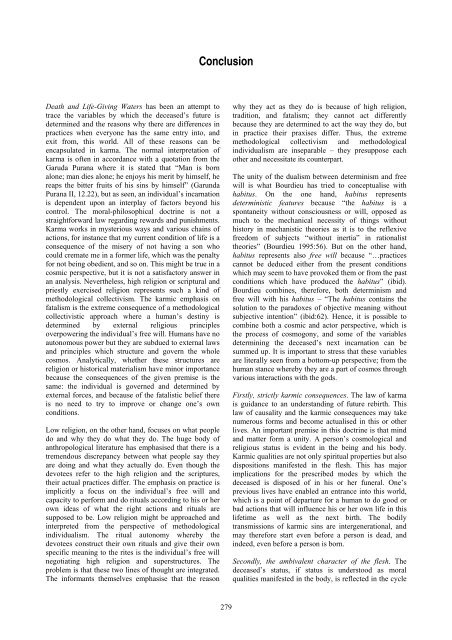
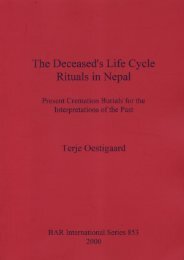


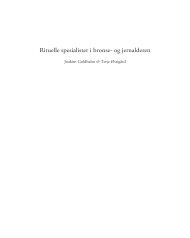
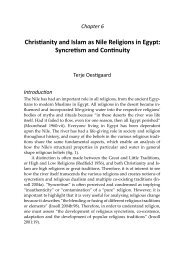
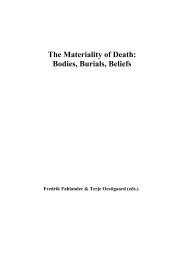


![Fullmono-AK [P2118].indd - oestigaard](https://img.yumpu.com/18994998/1/177x260/fullmono-ak-p2118indd-oestigaard.jpg?quality=85)